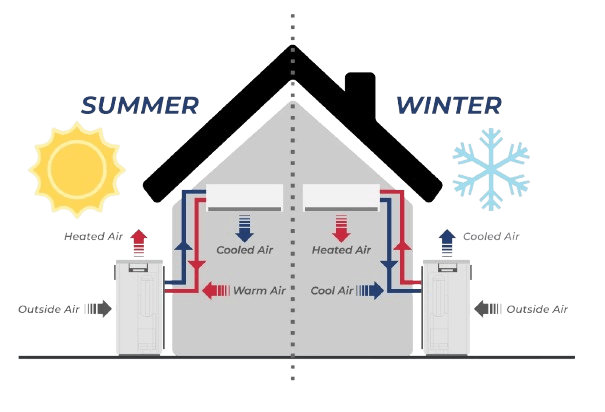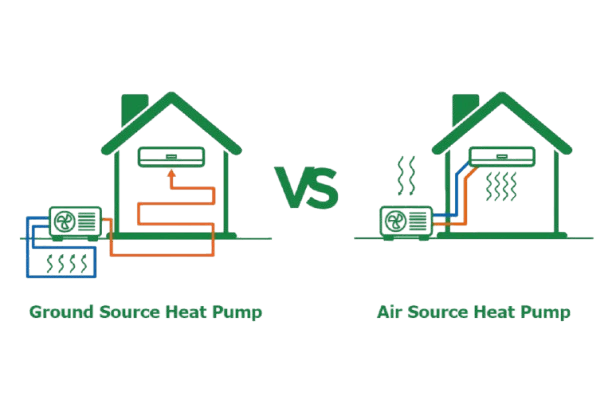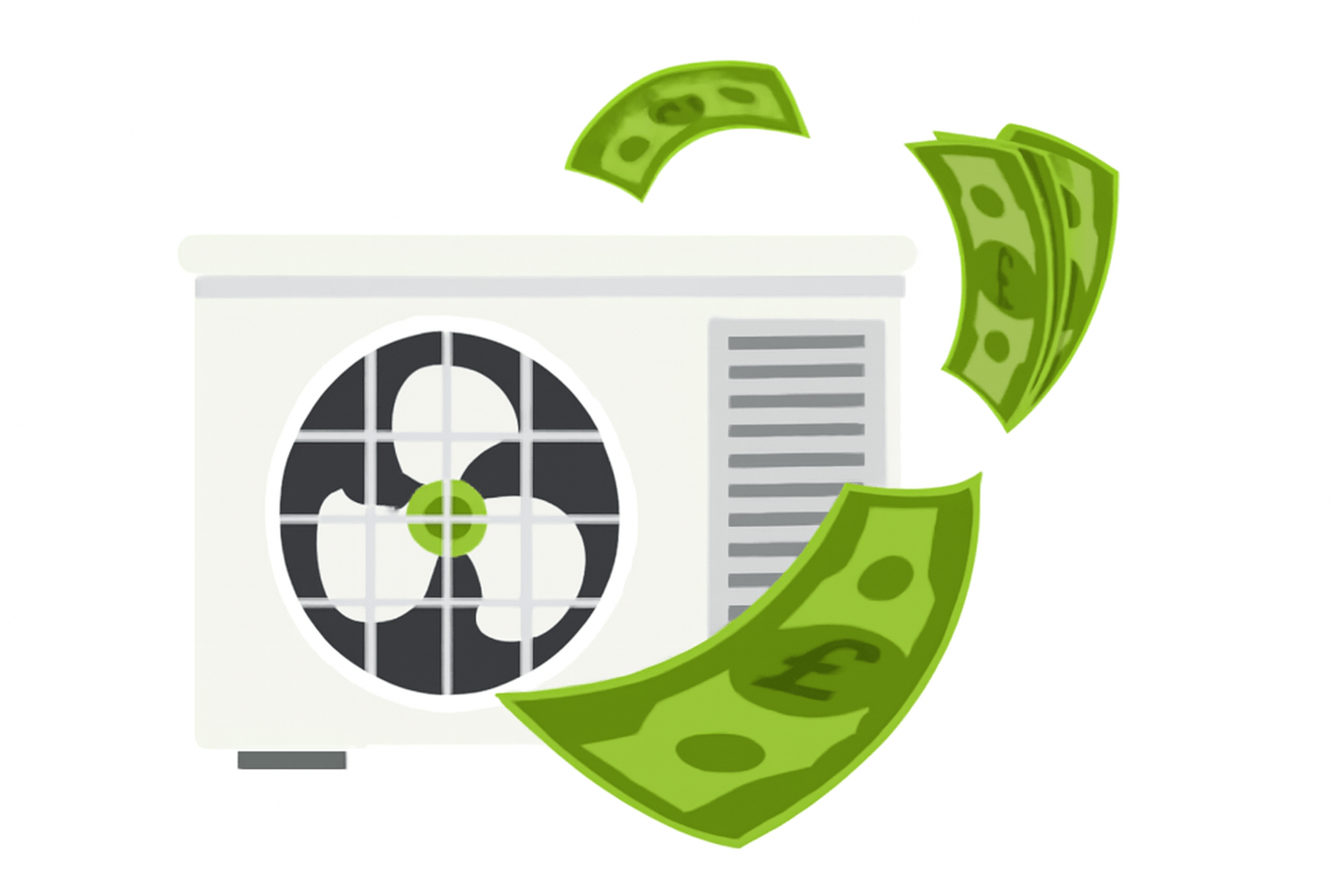UK Heat Pump Installation Cost Calculator
Select 'Yes' if your existing radiators are old, small, or single panel.
Select 'Yes' if you have a combi boiler or a small/old cylinder.
Get an Instant Heat Pump Estimate Without the Hassle: Try the Cost Calculator Today

In 2025, energy costs are climbing, and environmental concerns are pressing. If you're considering switching to a more energy-efficient heating system for your home, a heat pump system could be the perfect solution. However, understanding the heat pump cost and installation process is key to making an informed decision. One of the most efficient ways to gauge whether a heat pump is right for your home is by using a heat pump cost calculator UK. This tool helps you estimate the costs, potential savings, and running costs without any hassle or waiting for quotes.
In this comprehensive guide, we’ll break down everything you need to know about heat pumps, heat pump installation costs, and how to make the most of a heat pump cost calculator to figure out whether upgrading to a new heat pump is the right decision for you. Let’s dive in!
What Is a Heat Pump System?
A heat pump system is an energy-efficient method of heating your home by extracting heat from external sources like the air, ground, or even water. Unlike traditional gas boilers or oil boilers, which generate heat by burning fuel, a heat pump uses renewable energy to move heat into your home. It’s an eco-friendly alternative to conventional heating systems, significantly reducing your carbon footprint while offering substantial savings on your energy bills.
A typical heat pump operates with a coefficient of performance (COP) between 3 to 4, meaning for every 1 unit of electricity consumed, the heat pump generates 3 to 4 units of heat. This makes heat pumps one of the most efficient heating systems on the market today.
How Heat Pumps Work

Diagram showing how air flows in and out of a house during summer and winter. In summer, outside air is heated and cooled inside, while in winter, outside air is cooled and heated inside. Arrows indicate the direction of warm and cool air, with symbols for summer (sun) and winter (snowflake).
The heat pump system extracts heat from renewable sources, such as the air source heat pump or ground source heat pump, and transfers it into your home to provide heating and hot water. This process is made possible through the evaporation and condensation of a refrigerant fluid, which absorbs and releases heat as it moves through the system.
For air source heat pumps, the process works even in colder temperatures, with the ability to produce heat at low air temperature. This makes them a suitable option for homes in colder climates, where gas boilers or oil boilers may struggle to perform efficiently.
Air Source Heat Pump vs. Ground Source Heat Pump

Diagram showing how air flows in and out of a house during summer and winter. In summer, outside air is heated and cooled inside, while in winter, outside air is cooled and heated inside. Arrows indicate the direction of warm and cool air, with symbols for summer (sun) and winter (snowflake)."
While air source heat pumps extract heat from the air, ground source heat pumps pull heat from the ground. The latter involves a more complex installation process due to the need for digging trenches or boreholes to install the heat exchange system.
Air source heat pumps are typically slightly cheaper to install than ground source heat pumps, making them a popular choice for homeowners. However, ground source heat pumps can be more efficient in terms of energy usage because the temperature of the ground remains relatively constant throughout the year, providing a stable source of heat.
Why Use a Heat Pump Cost Calculator UK?
A heat pump cost calculator helps you understand the financial implications of switching to a heat pump system. The calculator provides an estimated cost for installing a new heat pump based on several factors, including your home’s size, insulation, energy demand, and heat pump type.
Using a heat pump cost calculator UK gives you:
Accurate cost estimates for installation and running costs
A better understanding of heat pump installation costs
The ability to assess how your energy bills could decrease in the future
Insight into whether you need additional upgrades, such as better insulation or bigger radiators
This tool makes it easier to compare various heat pump options and determine if this switch will help you save money over time.
The Key Benefits of Using a Heat Pump Cost Calculator

The image features a heat pump next to a piggy bank, symbolizing savings and energy efficiency. "It highlights budget planning, cost comparison, and long-term savings with a heat pump system."
1. Instant, Transparent Estimates: The calculator gives you a clear and accurate cost estimate for heat pump installation, without the need to speak to multiple installers or worry about hidden fees.
2. Better Budget Planning: Get a realistic view of your overall installation cost and running costs, helping you budget for your new heating system.
3. Cost Comparison: Compare different types of heat pumps, including air source and ground source heat pumps, and their respective installation costs.
4. Energy Demand & Savings Insight: Understand how much you could save on energy bills, especially when compared to a gas boiler or oil boilers.
By considering all these factors, a heat pump cost calculator helps you make an informed decision that aligns with your financial and environmental goals.
Factors Affecting Heat Pump Installation Costs
The cost of installing a heat pump can vary significantly depending on several factors. Here's a breakdown of the key influences:
Property Size: Larger homes may require a bigger heat pump capacity, which means higher installation costs.
Insulation Levels: Poorly insulated homes may require additional cavity wall or loft insulation to ensure the heat pump operates efficiently. This could increase the estimated cost.
Type of Heat Pump: Air source heat pumps are typically cheaper to install than ground source heat pumps, which require more extensive groundwork.
Location: The availability of heat pump installers in your area may also impact the overall cost. Areas with fewer installers may result in higher prices due to limited competition.
Existing Heating System: If your home currently has an oil boiler or gas boiler, the installation of a heat pump may require modifications to existing infrastructure, adding to the installation cost.
Typical Heat Pump Installation Costs
When it comes to heat pump installation costs, here’s what you can expect:
Air Source Heat Pumps: Typically, air source heat pump installation costs range from £7,000 to £14,000, depending on the system’s capacity and complexity of the installation.
Ground Source Heat Pumps: Ground source heat pumps are more expensive, with costs ranging from £20,000 to £35,000, due to the need for significant excavation work.
While these installation costs may seem high at first glance, the energy savings and government grants can make the investment more appealing in the long run.
Government Grants and Support for Heat Pumps
One of the best reasons to install a heat pump in 2025 is the Boiler Upgrade Scheme. This government initiative provides financial incentives to make the switch to cleaner energy sources:
Air source heat pumps can receive up to £5,000 in grants.
Ground source heat pumps are eligible for up to £6,000 in grants.
In addition to the Boiler Upgrade Scheme, you may also be able to access other regional government grants or incentives from energy companies like Octopus Energy, further reducing the installation costs.
Heat Pump Running Costs and Savings
One of the biggest advantages of a heat pump system is its running cost efficiency. Heat pumps can significantly reduce your energy bills compared to traditional gas boilers or oil boilers. The actual savings depend on your home’s insulation, energy demand, and the type of heat pump you install.
On average, heat pumps can save homeowners between 30% to 50% on their energy bills. For a typical three-bedroom home, this could translate to savings of £200 to £500 per year.
In the long run, the lower running costs of a heat pump mean that most homeowners will break even on their installation costs within 7 to 10 years.
Heat Pump Running Costs and Savings

A white air source heat pump with a four-blade fan and horizontal vents, accompanied by green pound sterling (£) banknotes floating around it.
One of the biggest advantages of a heat pump system is its running cost efficiency. Heat pumps can significantly reduce your energy bills compared to traditional gas boilers or oil boilers. The actual savings depend on your home’s insulation, energy demand, and the type of heat pump you install.
On average, heat pumps can save homeowners between 30% to 50% on their energy bills. For a typical three-bedroom home, this could translate to savings of £200 to £500 per year.
In the long run, the lower running costs of a heat pump mean that most homeowners will break even on their installation costs within 7 to 10 years.
Government Grants and Support for Heat Pumps
One of the best reasons to install a heat pump in 2025 is the Boiler Upgrade Scheme. This government initiative provides financial incentives to make the switch to cleaner energy sources:
Air source heat pumps can receive up to £5,000 in grants.
Ground source heat pumps are eligible for up to £6,000 in grants.
In addition to the Boiler Upgrade Scheme, you may also be able to access other regional government grants or incentives from energy companies like Octopus Energy, further reducing the installation costs.
How Heat Pumps Compare to Gas and Oil Boilers
When comparing heat pumps to gas boilers or oil boilers, the key difference lies in efficiency. While gas boilers are cheaper to install upfront, they are less energy-efficient in the long run. Heat pumps, on the other hand, have higher installation costs but offer significantly lower running costs, making them a more cost-effective solution in the long term.
Additionally, heat pumps can provide both heating and cooling, a feature that traditional gas boilers cannot offer.
FAQs About Heat Pumps
1. How much does it cost to install a heat pump?
The installation costs for a heat pump system can range from £7,000 to £35,000 depending on the type of heat pump (air source or ground source), the size of your home, and the level of insulation. Air source heat pumps are typically cheaper to install than ground source heat pumps, which require extensive groundwork. However, heat pumps offer significant energy savings over time, which can help offset these initial costs.
2. Are heat pumps worth the investment?
Yes! Heat pumps are a worthwhile investment for homeowners looking to reduce their carbon footprint and energy costs. Although the installation costs are higher compared to gas boilers or oil boilers, heat pumps have much lower running costs. Plus, government incentives like the Boiler Upgrade Scheme can help reduce upfront costs. Over time, the savings on energy bills and carbon emissions make heat pumps a smart, long-term investment.
3. How do I calculate the cost of installing a heat pump?
The best way to calculate the estimated cost of installing a heat pump is by using a heat pump cost calculator UK. By entering details about your home, such as its size, insulation level, and energy demand, the calculator will give you a quick and accurate estimate of installation costs, running costs, and potential savings.
4. Can I install a heat pump myself?
While it’s possible to install a heat pump yourself, it’s generally recommended to hire a professional heat pump installer. Installation involves working with electrical systems, refrigerants, and complex plumbing, all of which require specialized knowledge. A qualified installer will ensure your heat pump operates efficiently and safely, maximizing your savings.





